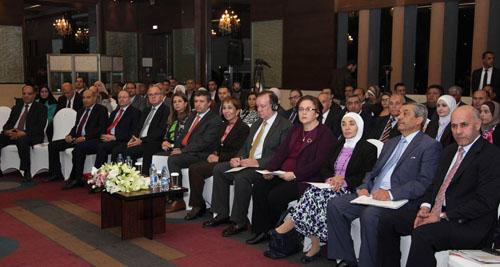You are here
Better vocational education needed for sustainable development — experts
By Laila Azzeh - Nov 04,2015 - Last updated at Nov 05,2015

HRH Princess Basma attends a ceremony to announce the outcomes of the State of Jordan’s Population Report 2014 on Wednesday (Petra photo)
AMMAN — If Jordan fails to capitalise on technical and vocational training in the coming years, it will be a major setback to its endeavours to reach sustainable development, experts said on Wednesday.
At a time when the country is in dire need of skilled human resources, the overall ratio of students enrolled in vocational and technical training stood at 17.5 per cent in 2011, 17.7 per cent in 2012 and 17 per cent in 2013, according to a report prepared by the Higher Population Council (HPC) with the support of the UNFPA.
“Technical and vocational training should enjoy special attention as a top national priority and a need for the future of our economy and young people,” said HRH Princess Basma, UNFPA goodwill ambassador.
Speaking at a ceremony to announce the outcomes of the State of Jordan’s Population Report 2014, the princess stressed the importance of changing young Jordanians’ mentality regarding vocational work.
“After years of focusing on universities and academic education, one of the main challenges now is to alter young people’s approach towards vocations,” she said.
According to the report, titled “Employment and Vocational Training and Technology Education”, there is a high discrepancy in employment of vocational training graduates when comparing the two sexes between 2011 and 2013 — 74.2 per cent males and 25.8 per cent females.
In addition, the report showed that 39 per cent of vocational and technical training graduates earn less than JD300 per month, while “no indication of any official action to increase the attractiveness of this sector to encourage more students to enrol in this type of education” was evident between 2011 and 2013.
Nearly 87 per cent of General Secondary Education Certificate Examination (Tawjihi) students chose to enrol in the academic stream in the last few years, the report said. It also described private sector participation in vocational and technical training as “very low”.
The report focuses on strategies that can be pursued in order to raise the number and efficiency of vocational graduates, particularly so that Jordan can benefit from the demographic opportunity it is projected to reach in 2030.
The demographic opportunity is a stage in a country’s development in which the ratio of dependents to workers is lowest.
“Vocational and technical training and education play a pivotal role in pushing economic growth forward and alleviating poverty and unemployment,” HPC Secretary General Sawsan Majali said.
“The population council will continue to draw projections and policies that show decision-makers the effects of demographic changes on development,” she added.
The report also provides a thorough analysis of challenges facing strategies governing the vocational and technical training sector, from curricula to employment opportunities.
Its main recommendations include establishing a higher council for human resources development, assessing the quality of vocational and technical training programmes and increasing the participation of local workers in the market.
In a discussion held during the ceremony, Labour Minister Nidal Katamine noted that the ministry and the private sector have arrived at an “acceptable” employment rate for guest workers in light of the sudden population increase due to the refugee crises.
Meanwhile, Vocational Training Corporation Director General Majed Habashneh underlined the need for the private sector to lead vocational training programmes, as it is the main employer of their graduates.
Related Articles
AMMAN — Vocational and technical education in Jordan continues to take a back seat to academic certificates, despite skilled human resources
The number of jobless Jordanians is expected to reach 400,000 in 2030 if the unemployment rate continues at its last year’s rate of 12.6 per cent, Secretary General of the Higher Population Council (HPC) Sawsan Majali said Sunday.
The Kingdom has witnessed several demographic changes over the past few decades that also led to a change in the age composition of its population, a Department of Statistics (DoS) report said on Thursday.

















